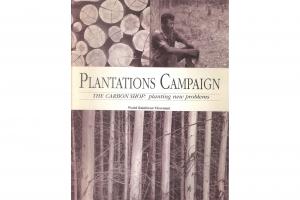Private commercial tree plantations began to be implemented in Colombia in the 1960s. Long-fibre wood commercial plantations --pine and cypress-- are mostly located in the West of the country, in the Departments of Antioquía, Caldas, Quindio, Risaralda, Valle and Cauca, while in the central zone --in the Departments of Cundinamarca and Boyacá-- there is a dominance of Eucalyptus globulus.
Large-Scale Tree Plantations
Industrial tree plantations are large-scale, intensively managed, even-aged monocultures, involving vast areas of fertile land under the control of plantation companies. Management of plantations involves the use of huge amounts of water as well as agrochemicals—which harm humans, and plants and animals in the plantations and surrounding areas.
Other information
13 February 2001
One of the issues that has not been addressed in the discussions about the World Bank's future Forest Policy and Strategy is that of the Bank's position regarding genetically modified organisms. This needs to be urgently addressed, particularly because the following information is generating concern within the environmental movement:
- Although the subject of genetically modified organisms has become one of the most visible environmental debates, the World Bank’s latest annual environmental report chooses to be silent on the issue.
Bulletin articles
13 December 2000
Malaysia is the world's top producer and exporter of palm oil, generating fifty percent of the global output, of which 85% is exported. Within the African continent, Nigeria is the country having the more extensive oil palm plantations, with at least 350,000 hectares planted to this crop. According to recent news, a Malaysian corporation will begin to invest in Nigeria's palm oil sector, with government support from both countries.
Bulletin articles
13 December 2000
A recent study, sponsored by CIFOR and WWF International’s Macroeconomics Program Office, provides an in-depth analysis of the features and consequences of the rapid expansion of the pulp and paper sector in Indonesia during the last decade.
Bulletin articles
13 December 2000
Thailand’s main logging agency, the state-owned Forestry Industry Organisation (FIO), is looking to certification of its tree plantations and ecotourism as a way out of its financial troubles as well as to cover-up its infamous past.
Bulletin articles
13 December 2000
The Vietnamese government is currently negotiating with a range of bilateral and multilateral "aid" agencies to raise funds for its five million hectare reforestation programme. So far, little of the estimated US$4.5 billion needed has been formally committed, but in December, the UN Food and Agriculture Organisation (FAO) announced a US$287,000 project "to promote the programme in Vietnam". On 7 December, Nguyen Van Dang, Vietnam's Rural Development Minister and Fernanda Guerrieri, FAO's representative in Vietnam, signed the agreement for the FAO project.
Bulletin articles
13 December 2000
In the last issue of the WRM bulletin we included an article --"Argentina: A shady carbon sink project"-- detailing an absurd and destructive tree plantation project in that country. Now we are pleased to inform you that the struggle against it has been successful. The Argentinian justice has prohibited the company to "carry out all the works related to the forestry project", which involved the clearcutting of 4400 hectares of native forest to be substituted with Oregon pine.
Bulletin articles
13 December 2000
In order to revamp its deteriorated image, the Chilean forestry sector launched in August the multimillion-dollar campaign “Forests for Chile”, consisting of propaganda in mass media aimed at convincing public opinion about the benefits of what it calls "forests" and which are in fact monoculture tree plantations (see WRM Bulletin 39).
Bulletin articles
13 December 2000
For more than 10 years Uruguay has been implementing an unsustainable forestry model, substituting its natural prairie ecosystems with large-scale eucalyptus and pine tree plantations.
Other information
13 December 2000
One of the major myths about tree plantations is that they help to alleviate pressures on forests by providing alternative wood sources. This has been proven false in practically all southern countries, but the myth still prevails in many circles, particularly among professional foresters. Another major myth is that plantations are "planted forests", having the same positive impacts as forests. This has also proven to be absolutely false, but foresters still insist in calling then "forests."
Bulletin articles
16 November 2000
The Sixth Conference of the Parties of the Convention on Climate Change is finally over and nothing much appears to have been achieved to address global warming. This doesn't come as a surprise, given that the majority of government delegates -- with a few exceptions -- focused more on how to obtain profits for their countries and corporations from the new carbon trade than on finding true solutions to the looming climate disaster.

